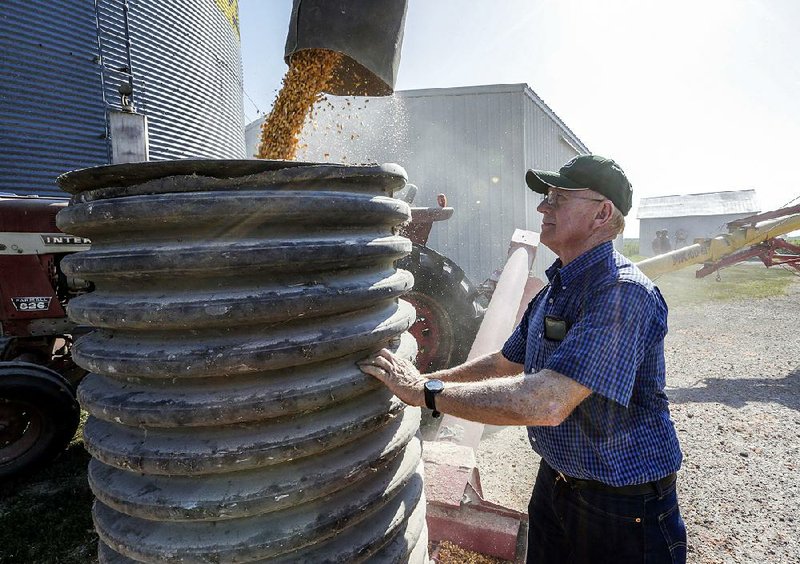President Donald Trump's trade disputes with China, Mexico and Canada are already eroding the value of American agricultural production, with soybean growers alone expected to lose at least $3.2 billion during the next crop season.
But many farmers -- including some whose incomes are plunging as exports stall -- are sticking by the man they helped vote into office. They'd just like him to win the trade war quickly, before the fall harvest starts compounding the problem in a couple of months -- when congressional midterm elections also will be heating up.
"President Trump is a businessman," said John King III, 57, who raises soybeans, corn and rice with his father and nephew outside Helena-West Helena. "He's making a high-risk business decision that probably should have been made a long time ago. But it's definitely a risk."
Agriculture is the third-biggest U.S. export industry and a global juggernaut that's generated six decades of trade surpluses. It's also become a flash point in tariff battles with China, which bought $12 billion of soybeans last year and now is shifting to supplies from South America. Separate duties are affecting sales to Canada and Mexico, which are renegotiating the North American Free Trade Agreement with the U.S.
Trump's trade policies already are changing the outlook for U.S. exports and farmer income, mostly because China, Mexico and Canada accounted for 43 percent of American farm exports last year.
The U.S. Department of Agriculture on Thursday predicted domestic soybean stockpiles will be 51 percent larger than expected a month earlier and cut its export forecast by 11 percent. The USDA also reduced its price forecast by 75 cents a bushel, citing reduced purchases by China, the top importer. That amounts to almost $3.2 billion in lost revenue based on the government's use estimate.
While the situation could get worse if the trade war escalates, the president has urged patience.
"Always thinking about our farmers," Trump said via tweet July 11 from the North Atlantic Treaty Organization summit in Brussels. "Other countries' trade barriers and tariffs have been destroying" U.S. farm businesses, he said. "I will open things up, better than ever before, but it can't go too quickly. I am fighting for a level playing field for our farmers, and will win!"
To be sure, farmers were big winners until recently. High commodity prices led to record net income of $123.8 billion in 2013, before a global glut sent markets tumbling. This year's projected net income of $59.5 billion would be the lowest since 2006, and the average farm business will see a 7 percent drop in 2018 to $339,300, compared with $437,400 in 2013, USDA data show. The country would still have an agricultural trade surplus of $21 billion.
Because the U.S. exports almost a third of its agricultural production, the industry is a logical target for foreign retaliation. It's also a key group among voters in rural counties that gave Trump 60 percent of the vote in the 2016 election. That, in theory, gives trade rivals an opportunity to inflict damage on his political base.
Groups representing crop and livestock producers have warned that their industries would be hurt by reduced exports at a time when they already face big inventories and lower prices. By September or October, many will need to have unloaded inventories from last year to make room for this season's harvest.
King said he sold about 60 percent of last year's soybeans for about $10 a bushel. That's nowhere near the record of more than $17 in 2012, but it's decent compared with about $8 now. King says he can't hold onto his remaining inventory once he starts collecting this year's crop.
The slumping market hasn't dimmed support for Trump among some farmers.
"The one thing I admire about the guy is that he's fulfilled or tried to fulfill" his campaign promises, said David Durham, 66, who grows corn and soybeans about 40 miles east of Kansas City, Mo. "In the long run, this could benefit us" by opening the world to more buyers of U.S. farm goods, said Durham, a fourth-generation farmer who estimates that his crop revenue has been cut in half since rumbles of a trade war began earlier this year.
Farmers thus far have been patient with the White House approach, Agriculture Secretary Sonny Perdue said Tuesday at an event in Washington.
"Many of them understand the reasons the president has taken this on," Perdue said. "China hasn't played by the rules for a long time."
Still the White House is readying an aid package for producers that's set to be unveiled around Labor Day in early September, just in time for the harvest, he said. Farmers are patriotic, "but you can't pay the bills with patriotism," Perdue said. Fighting a trade war is like going on a diet, he said. "It's going to be good to get there, but it will be a little bit painful in the meantime."
At least for now, support for Trump persists among farmers who have "concern and some worry" about where trade may be heading, said Will Rodger, spokesman for Farm Bureau in Washington. "Donald Trump is president of the United States, and he's the man many of them voted for," Rodger said in an interview. "It's not panic."
That's King's approach. Farmers understand why they're taking a hit, the Arkansas grower said. But if it lasts too long, some may feel the need to re-evaluate the president's wisdom.
"Time will tell," King said. "Let's see what price I get for the last 40 percent of my soybeans."
Business on 07/18/2018
